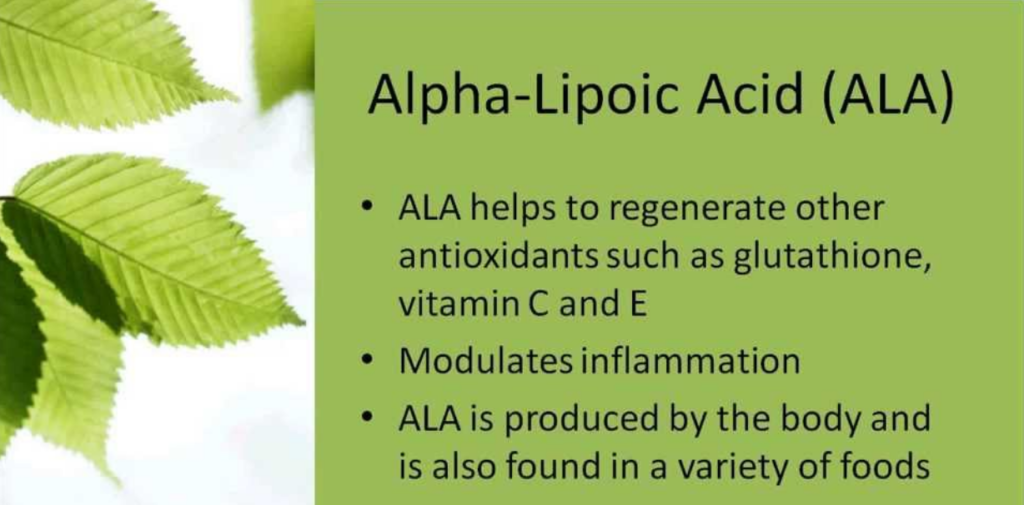Have you been keeping up with my “Secret Weapon of Mass Destruction Series?” If you have great! (Go here for the last post.) If you want to start at the beginning, go HERE.
In this excerpt of my “Secret Weapon of Mass Destruction Series,” I want to present another amazing protector of glutathione. This little jewel of an antioxidant is going to truly provide you some POWER, while also potentially cleaning up debris, e.g. the ravages of diabetes. Keep reading to find out more about Alpha Lipoic Acid (ALA).
![]()
ALA is a potent and protective antioxidant that has been shown to regenerate other antioxidants, such as glutathione, vitamin E and vitamin C, and to prevent protein glycosylation (reaction with sugar and carbohydrate). It is both fat and water-soluble, therefore it can penetrate basically all the body’s tissues (including the brain and nerves).
ALA has also been shown to enhance glucose uptake in skeletal muscle tissue, thus improving glucose regulation in people with diabetes mellitus. ALA helps prevent oxidative stress-induced changes in people with diabetes. It has also been shown to be effective in the treatment of diabetic peripheral neuropathy, a common complication in diabetes that affects over 18 million Americans. That’s huge, since there are over 26 million people suffering from type 2 diabetes in this country—that’s about 70% of the population with type 2 diabetes being a victim to neuropathy.
![]()

Neuropathy is an aggressive and painful condition, resulting in loss of sensation, tingling and weakness, predominantly in the hands and feet, and can result in foot ulcers & amputation. To protect yourself from these devastating conditions, access my E-Scription:
Unfortunately, most people in America are given pharmaceutical medications to treat the “SYMPTOMS” of neuropathy, but not advised what to do to prevent or treat diabetic neuropathy. Often we find that neuropathy symptoms may be the result of a vitamin B12 and/or folate deficiency. You will definitely want to determine this and treat it if needed. I will address vitamin B12 deficiency in another post, but know that having a micronutrient test is vital if you have neuropathy to determine the best method of treatment.
![]()
You will also want to assess your levels of ALA on the micronutrient test. There is great clinical data that confirms the effectiveness of treating diabetic neuropathy with ALA. The dosage amount is KEY: an oral dose of 600 mg provided the most optimum risk-to-benefit ratio in scientific studies.

One of my best supplement sources of ALA is in the Designs for Health, Metabolic Synergy, which contains 600 mg of ALA in one serving. This supplement is my “go-to” for treating most people with diabetes, once I have assessed their micronutrient panel, since it contains so many of the important nutrients needed by all people with diabetes. I even take this myself.
Although it is not likely that food sources alone will provide 600 mg of ALA, you can find ALA in the following food sources:
- organ meats
- spinach
- broccoli
- tomatoes
- yams
- carrots
- beets
- potatoes
- garden peas
- brussels sprouts
- rice bran
- yeast (especially brewer’s yeast)
![]()
Biosynthesis of ALA decreases with age and it is reduced in people with chronic diseases, e.g. diabetes. There is ongoing research on the benefits of ALA for conditions including:
- stroke
- dementia
- glaucoma
- migraines
- multiple sclerosis
- sun-damaged skin
- peripheral arterial disease
- retinopathy
Remember, dosage is key. Don’t expect good results if only your multi-vitamin/mineral preparation says it contains a small amount of ALA. This is the biggest reason why people say, “Oh, I have tried that, but it didn’t make any difference.”
The differences (improvements) that can occur are dependent on the dosage and the quality of that supplement.”
As with any treatment (conventional or functional), always be cautious of potential side effects. Here are some reported side-effects of ALA:
- skin rash
- stomach upset
- overstimulation
- fatigue
- insomnia
- decreased blood glucose levels
Always GET Tested before automatically supplementing with any nutrient, including ALA.
There are no studies on the effect of ALA in children or women who are pregnant or breastfeeding.
There is some evidence that shows that ALA may decrease thyroid levels. Also, food intake is reported to reduce the bioavailability of ALA, so general recommendations are to take ALA on an empty stomach.
For the next in the series of glutathione boosters, go HERE.
![]()









